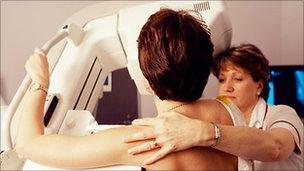Breast screening rate 'lower in deprived areas'
- Published

Uptake was much lower among women living in the most deprived areas
The percentage of women being screened for breast cancer is lower in poor areas than in more affluent parts of Scotland, according to official statistics.
NHS figures showed that about 75% of women aged between 50 and 70 were screened across Scotland in 2008/09.
This was above the national minimum standards target of 70%.
But while 82% of women in the least deprived areas were screened, uptake fell to 64% in the most deprived areas.
The report said this was because those living in the least deprived locations were more likely to accept an invitation to screening then those living in the most deprived areas.
The highest uptake was found in Shetland, with an attendance rate of 87%.
In 2008/09, approximately 1,200 invasive cancers were detected in women of all ages, of which about half were less than 15mm in size.
NHS officials said those figures highlighted the importance of screening in the early detection of breast cancer.
Public Health Minister Shona Robison said the Scottish breast screening programme was one of the principal reasons why more and more people were living with and beating cancer.
She said: "In 2003, we raised the upper age range for breast screening from 64 to 70. As a result we are now screening more women and detecting more cancers than ever before."
Scotland has seen a 23% fall in breast cancer mortality between 1994 and 2005.
Up until 2007/08, the screening method used in Scotland consisted of two mammographic views at first screen and one view at subsequent screens.
But since March this year a "two-view" screening - where women have two views at subsequent screenings - was introduced and is now used in all health boards across the country.